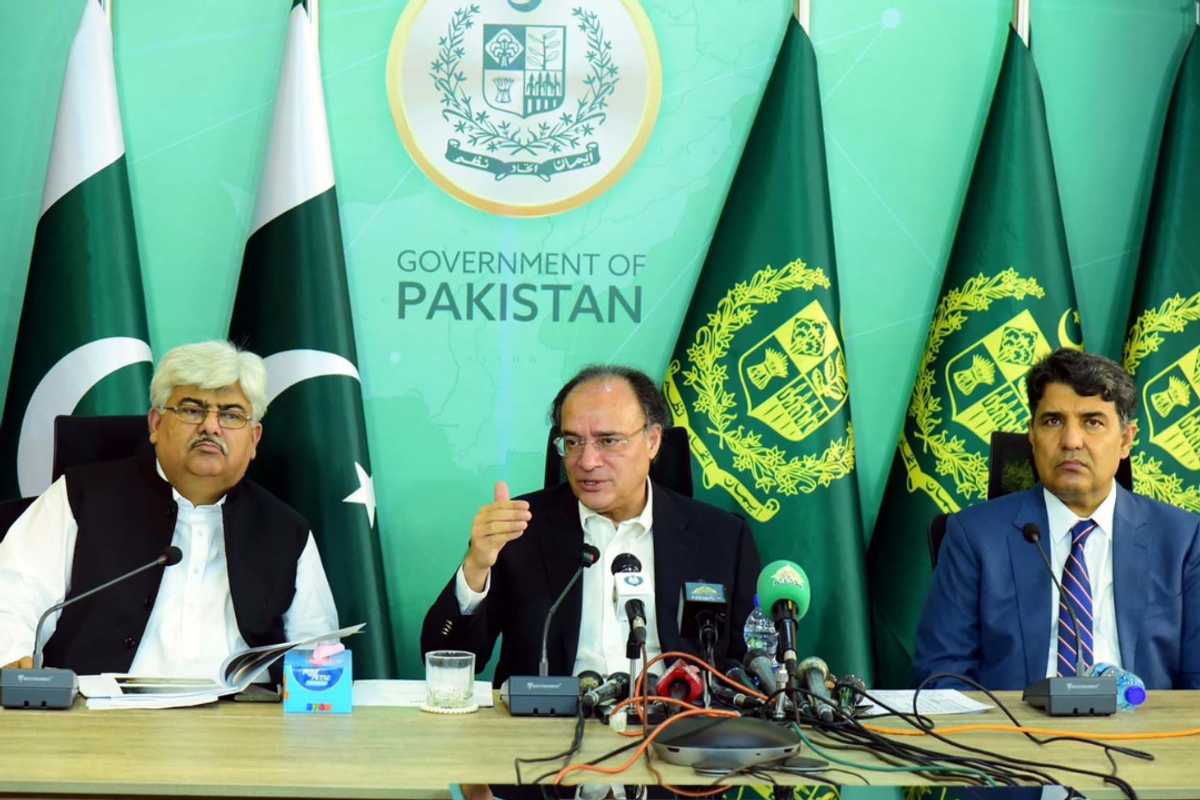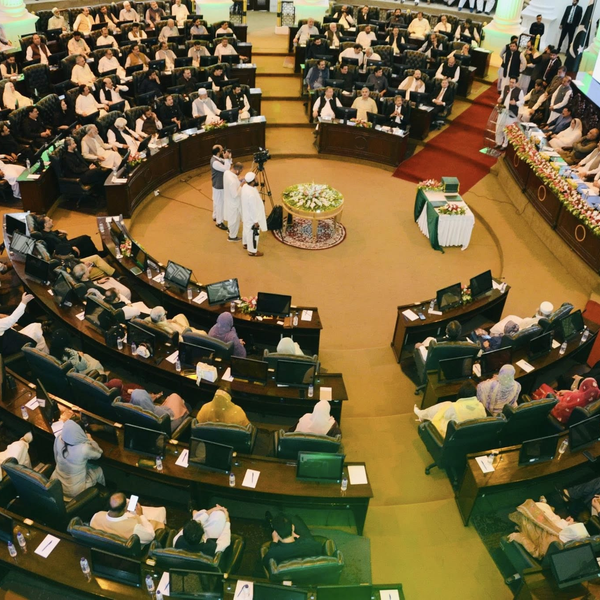Pakistan plans to curb PKR 1.3 trillion of under-filing in tax returns
Tax collection authority to hire 2,000 chartered accountants to improve auditing capabilities

Shahzad Raza
Correspondent
Shahzad; a journalist with 12+ years of experience, working in Multi Media. Worked in Field, covered Big Legal Constitutional and Political Events in Pakistan since 2012. Graduate of Islamic University Islamabad.

Pakistan Finance Minister Muhammad Aurangzeb (center) addresses a press conference in Islamabad
Non-filers to face stricter penalties, including being barred from purchasing vehicles
Only 14% of manufacturers and 25% of wholesalers are currently registered for sales tax
FBR will hire 2,000 chartered accountants to improve auditing capabilities
The government is taking steps to curb under-filing in tax returns amounting to PKR 1.3 trillion, Pakistan Finance Minister Muhammad Aurangzeb announced on Sunday.
Addressing a press conference in Islamabad, he acknowledged the challenges posed by under-filing and tax evasion, stating that the government is focused on transparency and swift correction of errors.
He also announced that non-filers will face stricter penalties, including being barred from purchasing vehicles and property or opening current bank accounts.
Moreover, non-compliant businesses would face strict measures, including the seizure of property, disconnection of utilities, and the blocking of mobile services, he warned.
"We are using technology to minimize direct contact between businesses and tax authorities, ensuring greater transparency," the finance minister said.
Aurangzeb also outlined the government's long-term goals of joining the Group of 20 (G20) by increasing the level of documented economic activity. "The cash market in Pakistan is worth PKR 9tr, but only PKR 325 billion is documented," he said, stressing the need for reforms that will increase transparency and boost tax-to-GDP ratio.
Aurangzeb discussed the government's ongoing efforts to combat smuggling, which has a PKR 750bn impact on tax revenue. The government is establishing digital checkpoints at major border crossings to curb illicit trade, he shared.
Additionally, he stressed the need to increase the tax base by bringing more manufacturers and wholesalers into the sales tax net. "Only 14% of manufacturers and 25% of wholesalers are currently registered for sales tax, which is unacceptable," he said.
In a major step toward enhancing tax collection efficiency, the finance minister announced that the Federal Board of Revenue will hire 2,000 chartered accountants to improve auditing capabilities.
He further noted that tax collectors will be offered incentives to increase revenue collection.
National Fiscal Pact
The finance minister also that the federal government will soon sign a National Fiscal Pact' with provincial administrations, aimed at bringing uniformity in provincial taxes and boosting revenue collection.
The agreement is set to formalize a unified approach between the federal government and all four provinces, with a focus on imposing taxes on agriculture and ensuring growth in provincial revenues.
Aurangzeb expressed his gratitude to provincial chief ministers for their cooperation.
"We have signed a staff-level agreement with the International Monetary Fund (IMF), and the provinces have agreed to impose taxes on the agriculture sector," he iterated.
The pact will also focus reducing federal and provincial expenditures and enhancing transparency in governance.
Govt 'right-sizing'
The finance minister revealed that a committee has been working on "right-sizing" the federal government to reduce public expenditures. "Decisions have been made about six ministries, including the dissolution of the Ministry of Capital Administration and Development, while two other ministries will be merged," he elaborated.
Additionally, the government is reviewing the structure of various ministries and subsidiaries, with plans for their reorganization already underway.
Aurangzeb added that 60% of vacant government positions totaling 150,000, have already been eliminated as part of an expenditure reduction strategy, which is expected to result in significant savings.
"These are not just announcements; we are taking practical steps toward implementation," he said, noting that five more ministries will undergo final restructuring this fiscal year, in accordance with the 18th Constitutional Amendment.
Economic outlook
Addressing Pakistan's economic outlook, Aurangzeb noted macroeconomic stability was achieved through the nine-month Stand-By Agreement (SBA) with the IMF that concluded in April.
Last week, the IMF Executive Board approved a 37-month $7 billion Extended Fund Facility (EFF) for Pakistan and the first tranche of funds has already been received.
Aurangzeb emphasized structural reforms and macroeconomic stability, which he said are crucial for sustainable economic progress. "Inflation, which once stood at 38%, has now declined to single digits, and the policy rate has been lowered due to falling inflation rates," he stated.
Aurangzeb also highlighted improvements in Pakistan's foreign exchange reserves and exports, noting that there has been a 29% year-on-year increase in IT exports. "The economy is on the right track, and we are witnessing positive trends in key economic indicators," he asserted.
The finance minister reiterated the government's commitment to reforming state-owned enterprises (SOEs) and ministries to ensure they function effectively for the public.
"We are working to improve performance and transparency, and any ministry or institution that remains will be restructured for optimal efficiency," he said. As part of this effort, the government is also addressing pension reforms, which will require amendments to the Civil Servants Act to provide legal backing for future pension plans.










Comments
See what people are discussing